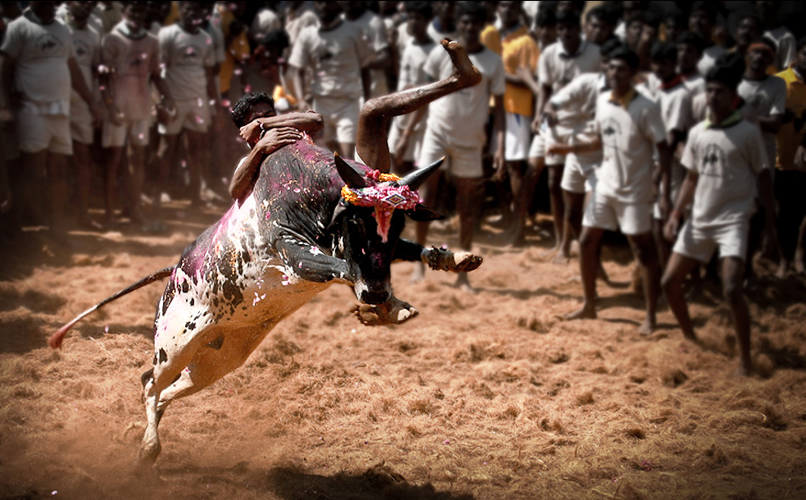
The Supreme Court has stayed the Centre’s notification that allowed Central Government’s notification allowing Jallikattu in Tamil Nadu, after several twists and turns.
First, as Justice R Banumati recused herself from hearing it, the three judge bench headed by the CJI, TS Thakur transferred the case to be listed before the bench headed by Justice Dipak Misra, who incidentally hears similar matters involving animal rights.
The reason for Justice Banumati recusing from hearing the case appears to be that she had at one point of time heard the case, and held the ban legal.
The other highlight of today's hearing was that the Attorney General, Mukul Rohatgi, who was widely reported to have advised the Centre against lifting the ban, submitted before the bench in favour of lifting the ban on holding Jallikattu.
Today's order, however, resulted in the stay of the 7 January notification. The order uploaded a short while ago, sums up the arguments of the counsel before the bench on the pros and cons of lifting the ban on Jallikattu.
The next date of listing the case, 15 March, is likely to provide further twists and turns, with both the Centre and the Tamil Nadu Government supporting the lifting of the ban through the Ordinance route.
The court issued notice to all states mentioned in the 7 January notification to file a response.
The petitioners were represented by senior advocates Aryama Sundaram (for AWBI), Anand Grover (for PETA), KK Venugopal (for FIAPO), Sidharth Luthra (for CUPA), Mr Venkatramani (for Sowmya Reddy and Radha Rajan) and Dushyant Dave (for Gauri Maulekhi, trustee, People for Animals).
People for the Ethical Treatment of Animals (PETA) said in a press statement: “The progress comes in response to a battery of urgent petitions filed with the court led by the government advisory body the Animal Welfare Board of India (AWBI) and supported by PETA India, the Federation of Indian Animal Protection Organisations (FIAPO) and Compassion Unlimited Plus Action (CUPA) against the 7 January 2016 notification. Further, individuals Sowmya Reddy, Radha Rajan and Gauri Maulekhi filed petitions against this notification, with two of them being contempt petitions. All of these petitions call for the court to strike down the 7 January 2016 notification permitting the use of bulls in events such as jallikattu in Tamil Nadu and bullock cart races elsewhere in the country.”
NG Jayasimha, member of the Animal Welfare Board of India and managing director of Humane Society International/India who was a co-petitioner in the the Supreme Court against the MoEFCC’s notification allowing Jallikattu commented in a press release: “We are delighted with the Supreme Court order. This is a huge victory for animals. We hope that the government of Tamil Nadu will follow this order and not allow Jallikattu to take place.”
Protests have erupted in Madurai over the stay, two days ahead of the Pongal festival that has been commonly associated with the Jallikattu, reported The Hindu.
Tamil Nadu Chief Minister J Jayalalithaa has urged the central government to issue an ordinance to enable the conduct of Jallikattu.
In a letter to Prime Minister Narendra Modi, Jayalalithaa said: “I strongly reiterate my earlier request to the government to promulgate an ordinance forthwith to enable the conduct of Jallikattu.”
Read the petition and background here
According to PETA, during J
terrified bulls are often deliberately disoriented by being given substances like alcohol; have their tails twisted and bitten; are stabbed and jabbed by sickles, spears, knives or sticks; and are punched, jumped on and dragged to the ground. Three bulls even died during jallikattu events in 2014. During races, bulls are often hit with nail-studded sticks and pushed beyond the point of exhaustion. In bullfights, which often occur in Goa, a round ends when one of the bulls manages to flee – or is killed.
Also, hundreds of human participants were injured each year when jallikattu was permitted, and many were killed. Between just 2010 and 2014, approximately 1,100 injuries to humans were reported by the media as a result of cruel and dangerous jallikattu-type events, and 17 people died – including a child. Since these figures were taken only from media reports currently available online, the actual figure is likely higher. Many human injuries also go unreported.
And here’s an undercover video of what can happen during Jallikattu (warning, graphic content):
Image Iamkarna
threads most popular
thread most upvoted
comment newest
first oldest
first
But this is a disaster for biodiversity and rural economy. Our Justices are against rural Hindus.
threads most popular
thread most upvoted
comment newest
first oldest
first